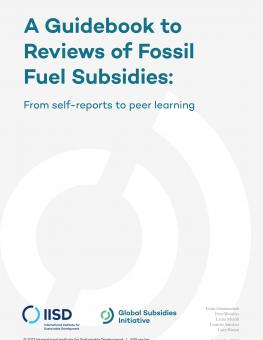
A Guidebook to Reviews of Fossil Fuel Subsidies: From self-reports to peer learning
This guidebook provides a step-by-step approach to government reviews of fossil fuel subsidies. The guidebook covers the design of reviews, identification, measurement and evaluation of subsidies, via country case studies and practical tools, as a first step towards transparency and reform.
With a global value of at least USD 425 billion a year, fossil fuel subsidies are often a fiscal burden, economically inefficient, socially regressive and environmentally harmful. From 2014 to 2016, over 50 countries removed some form of subsidies to fossil fuels through price and government policy changes.
This guidebook supports countries who intend to undertake self- or peer review of fossil fuel subsidies by clearly explaining the different elements of a review and providing case studies as to how countries have approached and undertaken reviews. The guidebook takes readers through a step-by-step approach to identifying and defining fossil fuel subsidies, reviewing the scope of a review, measuring subsidies, evaluating them and identifying the next steps towards the reform of subsidies. Country case studies are included from China, Finland, New Zealand, Peru and Sweden. Practical annexes are included that explain international commitments on fossil fuel subsidies, templates for identifying and reporting fossil fuel subsidies, and principles to follow for a review process. The guidebook supports country efforts around transparency on fossil fuel subsidies as the first step towards reform by sharing lessons and experiences from other countries.
Participating experts
Additional downloads
You might also be interested in
The Cost of Fossil Fuel Reliance
Government support for fossil fuels reached at least USD 1.5 trillion in 2023, new data shows.
Increased Support Needed to Achieve India's Clean Energy Goals
India is on track to achieve many of its 2030 clean energy goals but needs to step up government support measures to accelerate the deployment of offshore wind, electric vehicles, and green hydrogen, according to a new report.
Ending Export Credits for Oil and Gas: How OECD countries can end 2024 with a climate win
For a year now, Organisation of Petroleum Exporting Countries (OECD) governments have been negotiating an agreement that could put an end to oil and gas export finance. Following the acrimony in Baku, this would be a very real way for the OECD to show policy coherence, respond to calls from the poorest countries to stop subsidizing fossil fuels, and shift public finance to solutions.
Fossil Fuel Production, Renewable Energy, and Subsidy Reform in Nationally Determined Contributions 3.0
This policy brief provides an analysis of the critical benchmarks and recommendations necessary for aligning nationally determined contributions (NDCs) with the 1.5 °C target.